
Your customers want answers, and they want them now. But keeping a support team staffed around the clock is expensive and a fast track to agent burnout. It’s a tricky problem to solve.
The good news is that AI-powered chatbots are now a real, practical tool for businesses of all sizes that want to work smarter and keep customers happy. They can handle the simple, repetitive questions 24/7, freeing up your team for the conversations that truly need a human touch. This guide will walk you through the best AI-powered chatbots for business in 2026 to help you find the right one for your team.
What are AI-powered chatbots for business?
Think of AI-powered chatbots as smart assistants that use artificial intelligence to hold human-like conversations. They can chat with your customers on your website or even help your employees internally.
Unlike older, rule-based chatbots that felt clunky and would get stuck on questions they weren't programmed for, modern AI chatbots are much more flexible. They can figure out what someone is trying to ask, even if it's phrased oddly. They also learn from each conversation, getting smarter and more helpful over time. This lets them give personalized answers and automate tasks from answering customer questions to handling internal IT requests.
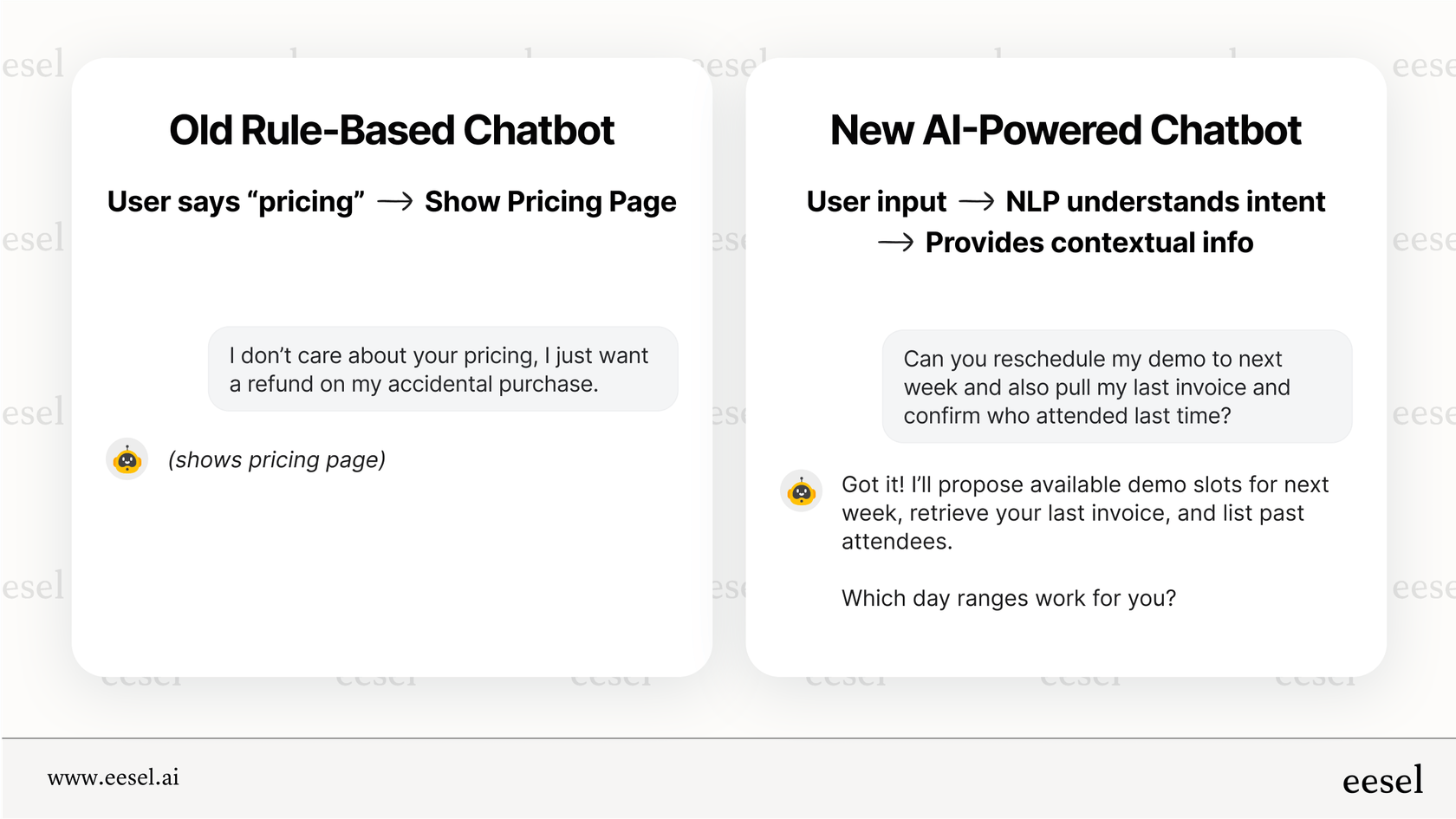
The benefits of AI-powered chatbots for business
If you're still weighing the pros and cons, it helps to see this less as a trend and more as a solution to common business headaches. Here’s why so many companies are bringing AI chatbots on board:
- You're always open: An AI chatbot doesn't need to sleep. It provides instant answers to your customers, no matter the time or day, which goes a long way toward keeping them happy.
- Lower support costs: Chatbots are great at handling the same questions over and over. This frees up your human agents to focus on the tricky issues that require their expertise. According to IBM, chatbots can help businesses cut customer service costs by up to 30%.
- Scale without stress: When you get a sudden flood of customer questions, a chatbot can handle thousands of conversations at once. You can grow your business without worrying if your support team can keep up.
- Better lead generation: A chatbot can chat with visitors on your website, ask a few qualifying questions, and even schedule demos, turning potential interest into actual leads while your team is offline. AI scheduling assistants can automate the entire booking process.
- Useful customer insights: Every conversation is a chance to learn. Chatbots can help you spot trends in what your customers are asking about, identify common problems, and gather feedback to improve your products and services.
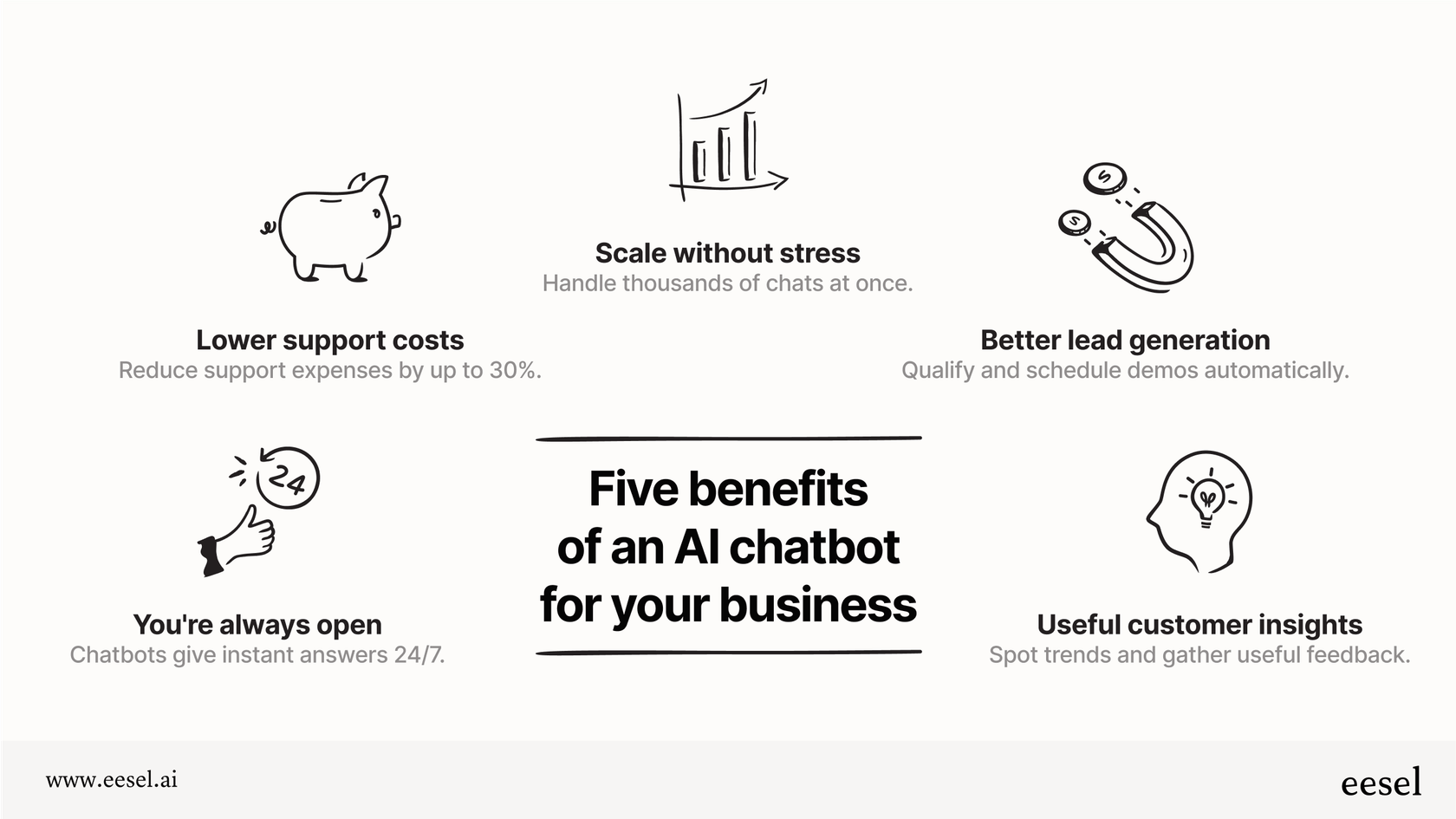
How we chose the best AI-powered chatbots for business
We didn’t just pull names out of a hat. We picked these tools by looking for the features that matter most to a modern business. Here’s what we focused on:
- Plays well with others: The best AI chatbot should connect to the tools you already have. We looked for platforms that integrate with your help desk, CRM, and knowledge bases without forcing you into a painful migration.
- How it learns: A chatbot is only as good as the information it's trained on. We searched for solutions that can learn from a company's private content like past support tickets and internal docs to give truly accurate answers.
- You're in control: You should be in the driver's seat. We chose platforms that let you define your bot's personality, set clear rules for when to pass a chat to a human, and test how it will perform before it goes live.
- Good value: You need to see a return on your investment. We favored platforms with clear, usage-based pricing that grows with you, without a bunch of hidden fees.
Comparison of the top AI-powered chatbots for business in 2026
Here’s a quick look at how our top picks stack up against each other.
| Tool | Best For | Key Differentiator | Starting Price (Annual) | Key Integrations |
|---|---|---|---|---|
| eesel AI | Integrating AI with existing tools | Layered platform, trains on past tickets & docs | $239/month | Zendesk, Freshdesk, Intercom, Slack, Confluence, Shopify |
| Zendesk AI | Leading solution for customer service teams | Deep integration within the Zendesk ecosystem | ~$50/agent/month (part of suite) | Zendesk Suite |
| Drift | B2B sales and lead qualification | Conversational marketing & sales focus | $2,500/month | Salesforce, Marketo, HubSpot |
| Tidio | Small businesses and e-commerce | Affordable all-in-one live chat & bot | $29/user/month | Shopify, WordPress, Wix |
| Zoho SalesIQ | Teams using the Zoho ecosystem | Deep integration with Zoho products | $7/operator/month | Zoho CRM, Zoho Desk, Salesforce |
A detailed look at the 6 best AI-powered chatbots for business
Let's dive a little deeper into what makes each of these platforms a solid choice.
1. eesel AI
eesel AI is an AI platform that works as a smart layer on top of the tools you already use. Instead of making you switch your help desk, it connects directly with systems like Zendesk, Freshdesk, and Slack to help automate your support.
The real standout feature of eesel AI is how it learns from your company's private information. You can connect it to your past support tickets, internal wikis, and knowledge bases like Confluence or Google Docs. This trains its AI products like its AI Agent, AI Copilot for agent assistance, and website AI Chatbot to give very accurate, specific answers. It can even do things for the customer, like looking up an order in Shopify or tagging a ticket correctly.
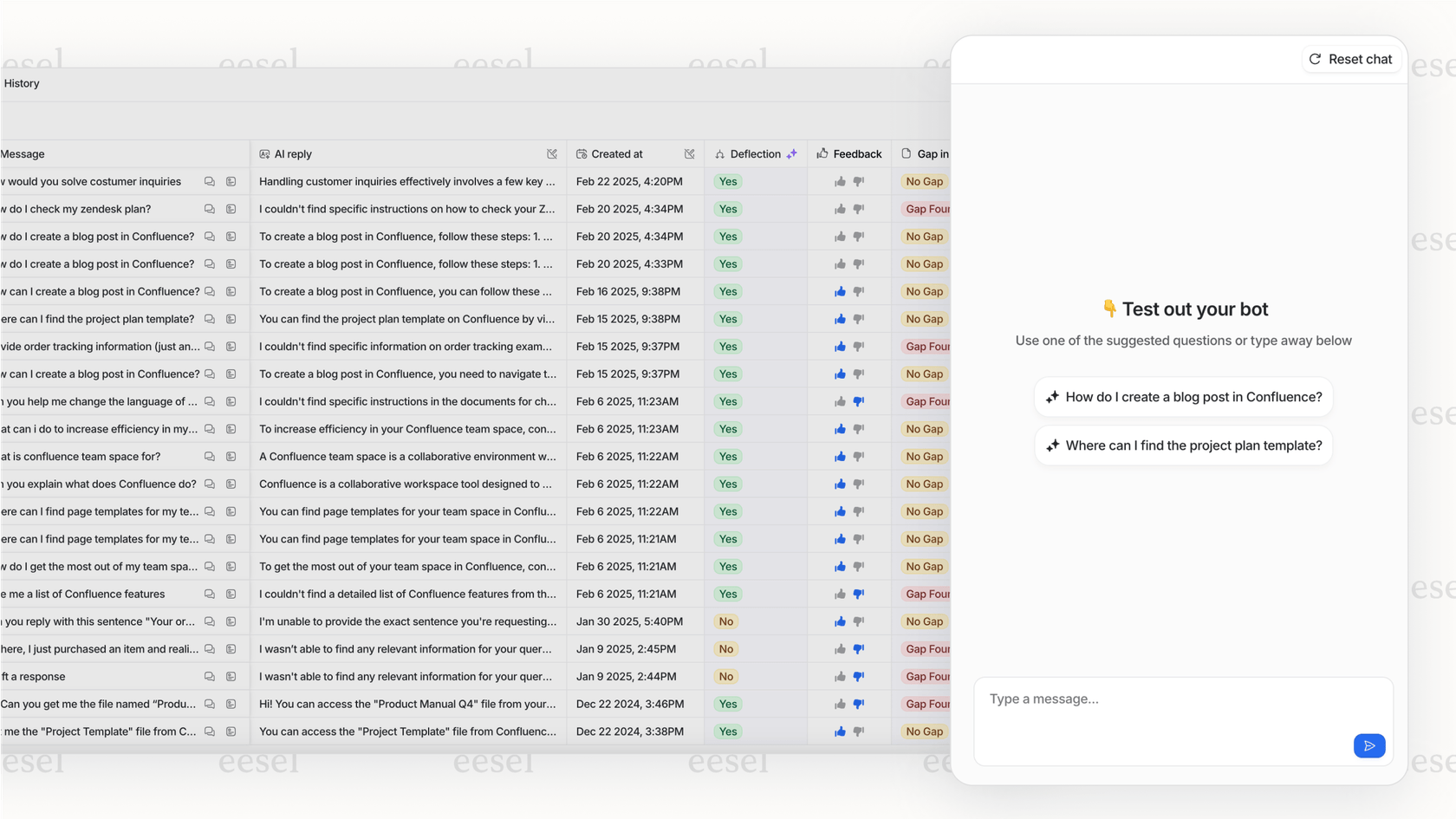
Pros:
- No big migration: It works with your current tools, saving you the time and headaches of a platform switch.
- Trains on your actual data: It learns from your team's past conversations, so its answers are much more relevant than bots trained on generic information.
- One solution for multiple needs: You get autonomous agents, help for your human team, and customer-facing chatbots all in one plan.
- Test before you launch: You can run a simulation on your past tickets in a private sandbox to see exactly how it will perform and calculate your savings before going live.
Cons:
- It might be more powerful than what's needed for a business with very simple, single-channel support.
Pricing: Plans start at $239/month (billed annually) for the Team plan, which includes up to 3 bots and 1,000 AI interactions per month.
2. Zendesk AI
If your team already uses Zendesk, its built-in AI agent is a powerful and convenient option. You can also connect Zendesk with WhatsApp for multichannel support. It’s designed to answer common questions by suggesting relevant articles from your help center and can handle simple tasks to take pressure off your agents. As a mature, industry-leading platform, Zendesk provides a reliable foundation for companies that want an enterprise-grade customer service ecosystem.
Pros:
- Seamless, out-of-the-box setup for existing Zendesk customers.
- Good for reducing ticket volume by encouraging customers to use your knowledge base.
- Automatically uses your Zendesk Guide content without any extra work, providing a consistent experience across the platform.
Cons:
- It is most effective when utilized as part of the broader, robust Zendesk ecosystem.
- It is highly optimized for content within the Zendesk platform, which is ideal for teams with centralized documentation.
Pricing: Zendesk's AI features are part of their Suite Professional plans and above, which start around $50 per agent/month.
3. Drift
Drift is a conversational marketing platform that is specialized in helping B2B companies generate and qualify leads. Its AI chatbots are designed to talk to website visitors in real-time with the main goal of booking meetings and speeding up the sales process.
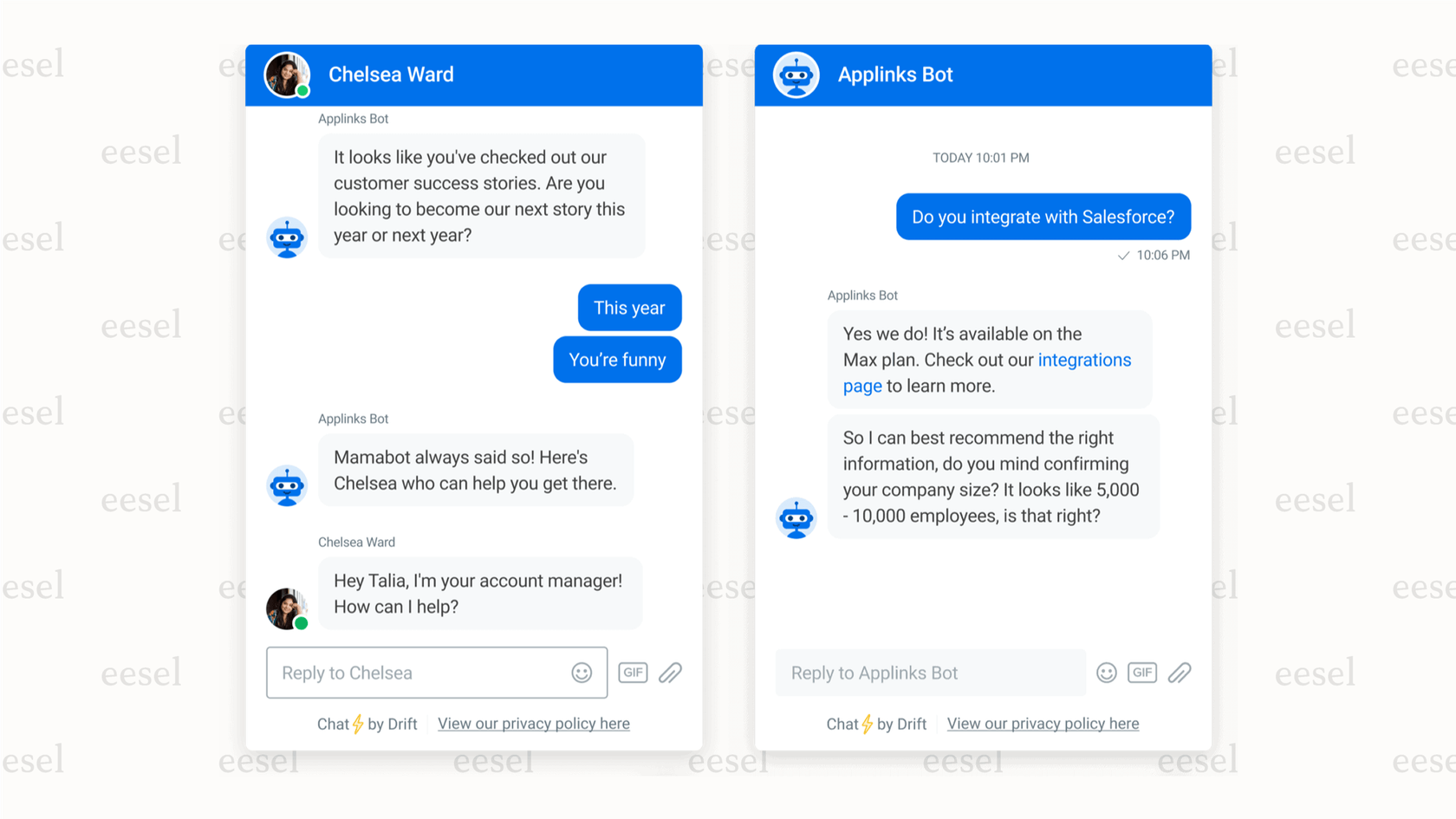
Pros:
- Very effective for automating the top of the sales funnel and qualifying new leads.
- Connects with sales calendars for quick and easy meeting booking.
- Gives you detailed information about website visitors to help sales teams focus their energy.
Cons:
- The high price tag makes it a big investment that might be out of reach for smaller companies.
- Its focus is on sales and marketing, so it's not the best choice if you need a single tool for all customer support.
Pricing: Drift’s plans start at $2,500 per month.
4. Tidio
Tidio puts live chat and AI chatbots together in one affordable package aimed at small and medium-sized businesses. It’s known for being simple to use and has a bunch of pre-built templates for things like recovering abandoned carts, tracking orders, and finding leads.
Pros:
- Very affordable, with a free plan that's great for getting started.
- Quick and easy to set up on your website with no coding required.
- Offers helpful built-in features for e-commerce stores on platforms like Shopify.
Cons:
- The AI is more basic and mostly follows pre-set rules and flows.
- It isn't built to handle complex, back-and-forth conversations and can't learn from detailed data like some of the other platforms.
Pricing: Paid plans start at $29 per month per user.
5. Zoho SalesIQ
Zoho SalesIQ is a live chat and chatbot platform that is tightly connected to the huge Zoho suite of business apps. It provides strong website visitor tracking, lead scoring, and customizable chatbots for engaging with prospects and supporting customers.
Pros:
- Great value for the money, especially if your business is already using Zoho CRM or Zoho Desk.
- The visitor tracking gives your sales and support teams helpful context for conversations.
- The no-code chatbot builder is simple and easy to get started with.
Cons:
- The user interface can feel a bit dated compared to some of its competitors.
- Like other AIs built into a specific ecosystem, its knowledge is limited, making it best for lead capture and simple FAQs rather than complex support automation.
Pricing: Paid plans start at just $7 per operator/month.
Key features to look for in AI-powered chatbots for business
Feeling a bit overwhelmed? Don't worry. When you're ready to decide, just focus on these four factors.
- Easy integrations: Your chatbot should make your job easier, not harder. Look for solutions like eesel AI that connect to the tools your team already uses every day. This helps you avoid a time-consuming migration and lets your team keep working where they're comfortable.
- Smart learning: The best chatbots are the ones that actually understand your business. Go for platforms that can train on your specific company information, like internal documents, private wikis, and past support chats.
- Good customization and control: A good chatbot isn't a black box. You need the ability to define its tone of voice, set clear rules for when a conversation should be handed over to a person, and test its performance before a customer ever talks to it.
- Bots that can do things, not just talk: Modern chatbots can do more than just chat. Look for a tool that can perform actions, like looking up an order status in Shopify or creating a new ticket in Jira Service Management. This allows the bot to solve problems on its own.
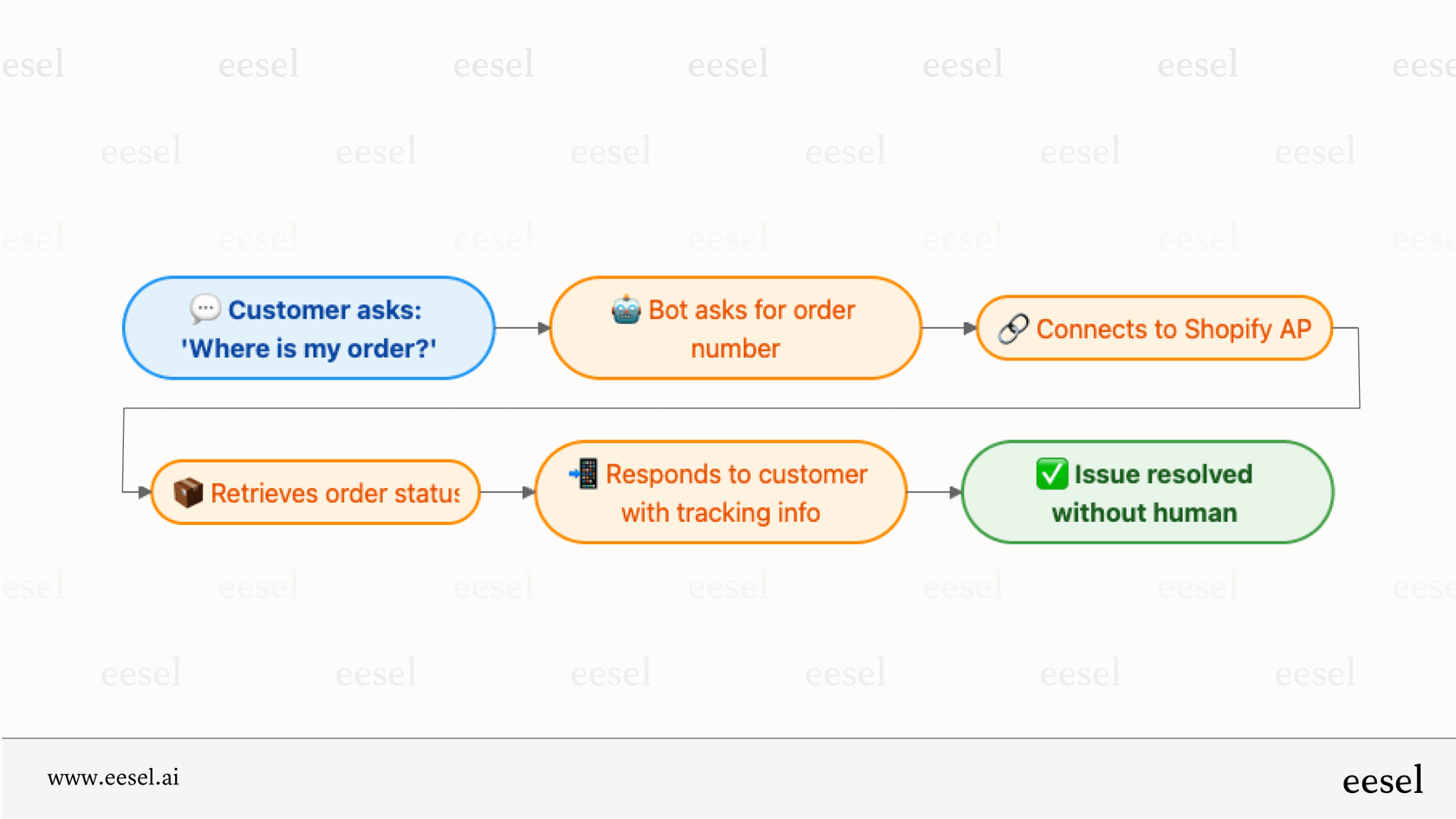
Choosing the right AI-powered chatbots for business
At the end of the day, the best AI-powered chatbot for your business is one that fits into your current workflow, not one that makes you change everything. It should connect smoothly with your existing tools, learn from your unique data to become an expert on your business, and help your team do their best work.
Be careful with solutions that require you to move all your data or lock you into a single closed-off system. An AI platform should be a flexible, smart layer that makes the tools you already use even better.
If you're curious about how AI can improve your current support setup without the hassle of a big migration, why not book a demo of eesel AI or start a free trial to see it for yourself?
Frequently asked questions
Many modern platforms are designed to be user-friendly with no-code interfaces. Solutions that connect to your existing knowledge bases and help desk tickets simplify the process, requiring minimal technical work to get started.
Reputable chatbot providers prioritize security with features like data encryption and compliance with privacy regulations like GDPR. They are designed to prevent the storage of sensitive personal data and focus only on the information needed to resolve a query.
Not at all. While some chatbots are part of a closed ecosystem, flexible platforms are built to integrate with the tools you already use. This allows you to add powerful AI capabilities to your current workflow without a disruptive migration.
You can measure ROI by tracking metrics like the percentage of inquiries resolved without human help and the reduction in agent-handled tickets. For sales, you can track the number of qualified leads or demos booked automatically by the bot.
Customers value getting instant answers to their questions, which modern AI chatbots provide 24/7. The key to a good experience is ensuring the bot can solve issues effectively and has a clear, seamless way to escalate complex problems to a human agent.
Yes, the best platforms can perform actions on behalf of the user. For example, they can look up an order status in your Shopify store, tag a support ticket in Zendesk, or book a meeting, solving problems instead of just providing information.
Share this post

Article by
Stevia Putri
Stevia Putri is a marketing generalist at eesel AI, where she helps turn powerful AI tools into stories that resonate. She’s driven by curiosity, clarity, and the human side of technology.





